含有be动词的一般疑问句
be动词的一般疑问句10个例句
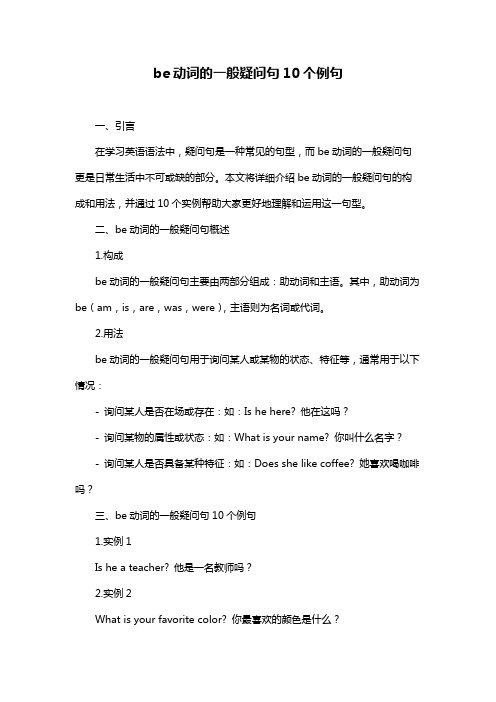
be动词的一般疑问句10个例句一、引言在学习英语语法中,疑问句是一种常见的句型,而be动词的一般疑问句更是日常生活中不可或缺的部分。
本文将详细介绍be动词的一般疑问句的构成和用法,并通过10个实例帮助大家更好地理解和运用这一句型。
二、be动词的一般疑问句概述1.构成be动词的一般疑问句主要由两部分组成:助动词和主语。
其中,助动词为be(am,is,are,was,were),主语则为名词或代词。
2.用法be动词的一般疑问句用于询问某人或某物的状态、特征等,通常用于以下情况:- 询问某人是否在场或存在:如:Is he here? 他在这吗?- 询问某物的属性或状态:如:What is your name? 你叫什么名字?- 询问某人是否具备某种特征:如:Does she like coffee? 她喜欢喝咖啡吗?三、be动词的一般疑问句10个例句1.实例1Is he a teacher? 他是一名教师吗?2.实例2What is your favorite color? 你最喜欢的颜色是什么?3.实例3Are they playing soccer? 他们在踢足球吗?4.实例4Was she born in New York? 她出生在纽约吗?5.实例5Were you at the party last night? 昨晚你参加了派对吗?6.实例6Is the library open? 图书馆开门了吗?7.实例7Does she speak French? 她会说法语吗?8.实例8Are they brothers? 他们是兄弟吗?9.实例9What was the movie about? 这部电影讲的是什么?10.实例10Is it hot today? 今天很热吗?四、结论通过以上10个实例,我们可以看出be动词的一般疑问句在英语交流中无处不在。
掌握这一句型,不仅有助于我们更好地提问,还能提高英语表达的准确性和地道性。
be动词的一般疑问句10个例句

be动词的一般疑问句10个例句
摘要:
1.概述:本文主要介绍be 动词的一般疑问句的构成和10 个例句。
2.be 动词一般疑问句的构成
3.例句1-5
4.例句6-10
5.总结:学习be 动词一般疑问句的重要性
正文:
1.概述
本文主要介绍be 动词的一般疑问句的构成和10 个例句。
对于学习英语的人来说,掌握be 动词的一般疑问句是非常重要的,因为它是英语语法中的基础。
2.be 动词一般疑问句的构成
be 动词一般疑问句的构成是:“be 动词(am/is/are)+ 主语+?”。
其中,be 动词有三种形式:am(用于第一人称单数)、is(用于第三人称单数)、are(用于第二人称和复数)。
3.例句1-5
以下是be 动词一般疑问句的5 个例句:
- Am I a student?(我是学生吗?)
- Is he a teacher?(他是老师吗?)
- Are you a doctor?(你是医生吗?)
- Is she a nurse?(她是护士吗?)
- Are they students?(他们是学生吗?)
4.例句6-10
以下是另外5 个例句:
- Am I a cat?(我是猫吗?)
- Is it a dog?(它是狗吗?)
- Are you a bird?(你是鸟吗?)
- Is that a plane?(那是飞机吗?)
- Are those apples?(那些是苹果吗?)
5.总结
学习be 动词一般疑问句对于英语学习者来说非常重要,因为它是英语语法的基础。
初一英语上册:含be动词一般疑问句考点
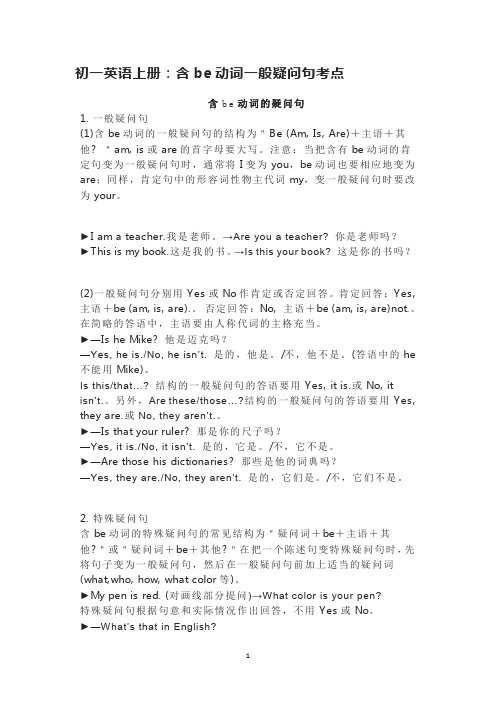
初一英语上册:含be动词一般疑问句考点含be动词的疑问句1. 一般疑问句(1)含be动词的一般疑问句的结构为"Be (Am, Is, Are)+主语+其他? "am, is或are的首字母要大写。
注意:当把含有be动词的肯定句变为一般疑问句时,通常将I变为you,be动词也要相应地变为are;同样,肯定句中的形容词性物主代词my,变一般疑问句时要改为your。
►I am a teacher.我是老师。
→Are you a teacher? 你是老师吗?►This is my book.这是我的书。
→Is this your book? 这是你的书吗?(2)一般疑问句分别用Yes或No作肯定或否定回答。
肯定回答:Yes, 主语+be (am, is, are).。
否定回答:No, 主语+be (am, is, are)not.。
在简略的答语中,主语要由人称代词的主格充当。
►—Is he Mike? 他是迈克吗?—Yes, he is./No, he isn’t. 是的,他是。
/不,他不是。
(答语中的he 不能用Mike)。
Is this/that…? 结构的一般疑问句的答语要用Yes, it is.或No, it isn’t.。
另外,Are these/those…?结构的一般疑问句的答语要用Yes, they are.或No, they aren’t.。
►—Is that your ruler? 那是你的尺子吗?—Yes, it is./No, it isn’t. 是的,它是。
/不,它不是。
►—Are those his dictionaries? 那些是他的词典吗?—Yes, they are./No, they aren’t. 是的,它们是。
/不,它们不是。
2. 特殊疑问句含be动词的特殊疑问句的常见结构为"疑问词+be+主语+其他?"或"疑问词+be+其他?"在把一个陈述句变特殊疑问句时,先将句子变为一般疑问句,然后在一般疑问句前加上适当的疑问词(what,who, how, what color等)。
(完整)英语一般疑问句(语法)
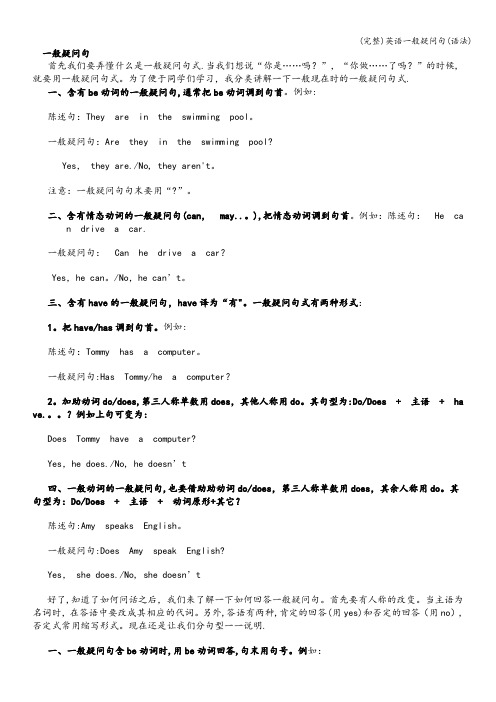
一般疑问句首先我们要弄懂什么是一般疑问句式.当我们想说“你是……吗?”,“你做……了吗?”的时候,就要用一般疑问句式。
为了便于同学们学习,我分类讲解一下一般现在时的一般疑问句式.一、含有be动词的一般疑问句,通常把be动词调到句首。
例如:陈述句:They are in the swimming pool。
一般疑问句:Are they in the swimming pool?Yes, they are./No, they aren't。
注意:一般疑问句句末要用“?”。
二、含有情态动词的一般疑问句(can,may..。
),把情态动词调到句首。
例如:陈述句: He can drive a car.一般疑问句:Can he drive a car?Yes,he can。
/No,he can’t。
三、含有have的一般疑问句,have译为“有"。
一般疑问句式有两种形式:1。
把have/has调到句首。
例如:陈述句:Tommy has a computer。
一般疑问句:Has Tommy/he a computer?2。
加助动词do/does,第三人称单数用does,其他人称用do。
其句型为:Do/Does + 主语+ ha ve.。
?例如上句可变为:Does Tommy have a computer?Yes,he does./No, he doesn’t四、一般动词的一般疑问句,也要借助助动词do/does,第三人称单数用does,其余人称用do。
其句型为:Do/Does + 主语+ 动词原形+其它?陈述句:Amy speaks English。
一般疑问句:Does Amy speak English?Yes, she does./No, she doesn’t好了,知道了如何问话之后,我们来了解一下如何回答一般疑问句。
首先要有人称的改变。
当主语为名词时,在答语中要改成其相应的代词。
英语一般疑问句(语法)

一般疑问句首先我们要弄懂什么是一般疑问句式。
当我们想说“你是……吗?”,“你做……了吗?”的时候,就要用一般疑问句式。
为了便于同学们学习,我分类讲解一下一般现在时的一般疑问句式。
一、含有be动词的一般疑问句,通常把be动词调到句首。
例如:陈述句:They are in the swimming pool.一般疑问句:Are they in the swimming pool?Yes,theyare./No,theyaren’t.注意:一般疑问句句末要用“?”。
二、含有情态动词的一般疑问句(can, may...),把情态动词调到句首。
例如:陈述句:He can drive a car.一般疑问句: Can he drive a car?Yes,hecan./No,hecan’t.三、含有have的一般疑问句,have译为“有”。
一般疑问句式有两种形式:1.把have/has调到句首。
例如:陈述句:Tommy has a computer.一般疑问句:Has Tommy/he a computer?2.加助动词do/does,第三人称单数用does,其他人称用do。
其句型为:Do/Does +主语+ have...?例如上句可变为:Does Tommy have a computer?Yes,hedoes./No,hedoesn’t四、一般动词的一般疑问句,也要借助助动词do/does,第三人称单数用does,其余人称用do。
其句型为:Do/Does +主语+动词原形+其它?陈述句:Amy speaks English.一般疑问句:Does Amy speak English?Yes,shedoes./No,shedoesn’t好了,知道了如何问话之后,我们来了解一下如何回答一般疑问句。
首先要有人称的改变。
当主语为名词时,在答语中要改成其相应的代词。
另外,答语有两种,肯定的回答(用yes)和否定的回答(用no),否定式常用缩写形式。
be动词引导的一般疑问句

变
变
变
1.He is a student.
Is he a student?
2.They are fri?
3.I am a doctor.
(我是个医生)
Are you a boy? (你是个医生吗?)
一般疑问句的构成法则:
1. I am from England. Are you from England? Yes, I am./ No, I’m not. 2. I’m a girl. Are you a girl? Yes, I am. No, I’m not. 3. We’re fourteen years old. Are you fourteen years old? Yes, we are. No,we aren't.
Thank you!
4. He’s my cousin. Is he your cousin? Yes, he is. No, he isn’t. 5.I’m Mr. Green’s daughter. Are you Mr. Green’s daughter? Yes, I am. No, I’m not. 6. Grace is a doctor. Is Grace a doctor? Yes, she is. No, she isn’t.
1.一提 be 动词提到句首 2. 二变 大小写 、人称 3. 三问号 句子末尾加问号
一般疑问句答语:
肯定回答:
Yes,主语+be (am/ is/ are).
注意:简略回答时不能用缩写形式
否定回答:
No,主语+be (am/is/are )+not
注意:必须用缩写形式。 主语是I时用缩写I’m not.
be动词的一般疑问句10个例句
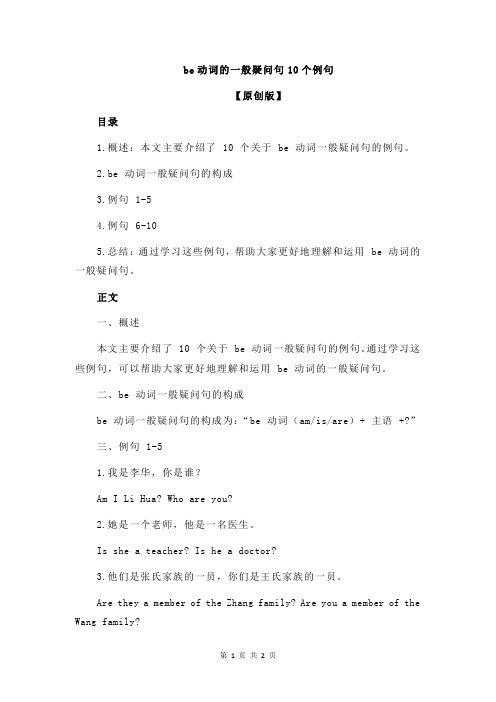
be动词的一般疑问句10个例句【原创版】目录1.概述:本文主要介绍了 10 个关于 be 动词一般疑问句的例句。
2.be 动词一般疑问句的构成3.例句 1-54.例句 6-105.总结:通过学习这些例句,帮助大家更好地理解和运用 be 动词的一般疑问句。
正文一、概述本文主要介绍了 10 个关于 be 动词一般疑问句的例句。
通过学习这些例句,可以帮助大家更好地理解和运用 be 动词的一般疑问句。
二、be 动词一般疑问句的构成be 动词一般疑问句的构成为:“be 动词(am/is/are)+ 主语 +?”三、例句 1-51.我是李华,你是谁?Am I Li Hua? Who are you?2.她是一个老师,他是一名医生。
Is she a teacher? Is he a doctor?3.他们是张氏家族的一员,你们是王氏家族的一员。
Are they a member of the Zhang family? Are you a member of the Wang family?4.猫是哺乳动物,鸟是脊椎动物。
Is a cat a mammal? Is a bird a vertebrate?5.这个苹果是红色的,那个香蕉是什么颜色的?Is this apple red? What color is that banana?四、例句 6-106.你是哪里人?Where are you from?7.他现在在干嘛?What is he doing now?8.她多大了?How old is she?9.他们结婚了吗?Did they get married?10.你会游泳吗?Can you swim?五、总结通过学习这 10 个关于 be 动词一般疑问句的例句,可以帮助大家更好地理解和运用 be 动词的一般疑问句。
be动词的一般疑问句10个例句
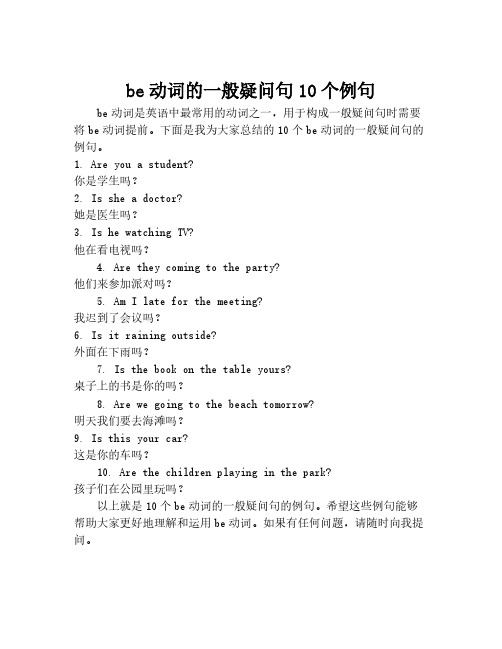
be动词的一般疑问句10个例句be动词是英语中最常用的动词之一,用于构成一般疑问句时需要将be动词提前。
下面是我为大家总结的10个be动词的一般疑问句的例句。
1. Are you a student?
你是学生吗?
2. Is she a doctor?
她是医生吗?
3. Is he watching TV?
他在看电视吗?
4. Are they coming to the party?
他们来参加派对吗?
5. Am I late for the meeting?
我迟到了会议吗?
6. Is it raining outside?
外面在下雨吗?
7. Is the book on the table yours?
桌子上的书是你的吗?
8. Are we going to the beach tomorrow?
明天我们要去海滩吗?
9. Is this your car?
这是你的车吗?
10. Are the children playing in the park?
孩子们在公园里玩吗?
以上就是10个be动词的一般疑问句的例句。
希望这些例句能够帮助大家更好地理解和运用be动词。
如果有任何问题,请随时向我提问。
be动词的一般疑问句10个例句

be动词的一般疑问句10个例句摘要:1.概述:本文将介绍be 动词的一般疑问句及其用法2.be 动词的一般疑问句构成3.be 动词的一般疑问句的回答方式4.例句1-10 及解析5.be 动词一般疑问句在日常生活中的应用正文:一、概述本文将详细解释be 动词的一般疑问句,包括其构成方式和在日常生活中的应用。
一般疑问句是英语中常见的一种句型,用于询问某个事物的属性、状态或特征。
二、be 动词的一般疑问句构成be 动词的一般疑问句由两部分组成:助动词be(am,is,are,was,were)和主语。
例如:- Am I a student?- Is she a doctor?- Are they teachers?- Was he a worker?- Were you here yesterday?三、be 动词的一般疑问句的回答方式对于be 动词的一般疑问句,回答方式有两种:肯定回答和否定回答。
肯定回答用“Yes,我是/他是/她是/我们/你们/他们是”,否定回答用“No,我不是/他不是/她不是/我们/你们/他们不是”。
四、例句1-10 及解析1.Am I a student? 我是学生吗?2.Is she a doctor? 她是医生吗?3.Are they teachers? 他们是老师吗?4.Was he a worker? 他是工人吗?5.Were you here yesterday? 你昨天在这里吗?6.Is it a cat? 它是猫吗?7.Are you hungry? 你饿了吗?8.Am I right? 我是对的吗?9.Is that your book? 那是你的书吗?10.Were they happy? 他们开心吗?五、be 动词一般疑问句在日常生活中的应用be 动词的一般疑问句在日常生活中的应用非常广泛,可以用于询问别人的身份、状态、职业等等。
例如,当你看到一个陌生人,你可以用“Are you a student?”来询问他是否是学生。
be动词引导的一般疑问句

资料仅供参考
1. I am from England. 资料仅供参考 Are you from England? Yes, I am./ No, I’m not.
2. I’m a girl. Are you a girl? Yes, I am. No, I’m not.
3. We’re fourteen years old. Are you fourteen years old? Yes, we are. No,we aren't.
4. He’s my cousin. 资料仅供参考
Is he your cousin?
Yes, he is. No, he isn’t. 5.I’m Mr. Green’s daughter.
资料仅供参考
资料仅供参考
变
资料仅供参考
变
资料仅供参考
变
资料仅供参考
资料仅供参考
1.He is a student.
Is he a student?
2.They are friends.
Are t
3.I am a doctor. (我是个医生) Are you a boy? (你是个医生吗?)
Are you Mr. Green’s
daughter?
Yes, I am. No, I’m not.
6. Grace is a doctor.
Is Grace a doctor?
Yes, she is. No, she isn’t.
资料仅供参考
Thank you!
一般疑问句的资料构仅供参考 成法则:
1.一提 be 动词提到句首
(完整版)含有be动词的一般疑问句
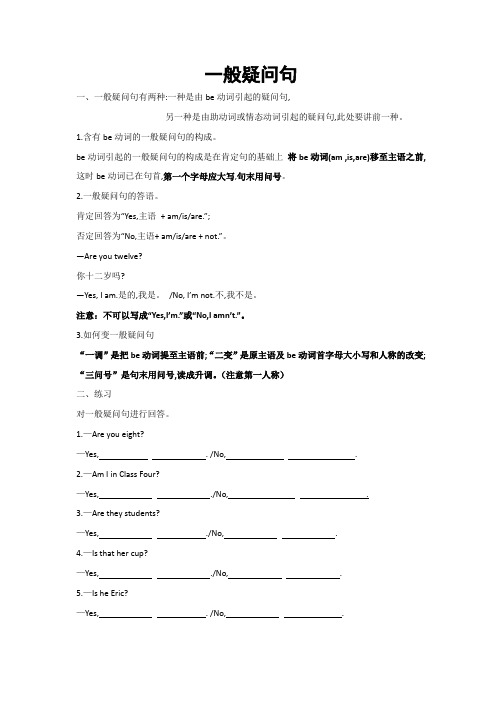
一般疑问句一、一般疑问句有两种:一种是由be动词引起的疑问句,另一种是由助动词或情态动词引起的疑问句,此处要讲前一种。
1.含有be动词的一般疑问句的构成。
be动词引起的一般疑问句的构成是在肯定句的基础上将be动词(am ,is,are)移至主语之前,这时be动词已在句首,第一个字母应大写,句末用问号。
2.一般疑问句的答语。
肯定回答为“Yes,主语+ am/is/are.”;否定回答为“No,主语+ am/is/are + not.”。
—Are you twelve?你十二岁吗?—Yes, I am.是的,我是。
/No, I’m not.不,我不是。
注意:不可以写成“Yes,I’m.”或“No,I amn’t.”。
3.如何变一般疑问句“一调”是把be动词提至主语前;“二变”是原主语及be动词首字母大小写和人称的改变;“三问号”是句末用问号,读成升调。
(注意第一人称)二、练习对一般疑问句进行回答。
1.—Are you eight?—Yes,. /No,.2.—Am I in Class Four?—Yes,./No,.3.—Are they students?—Yes,./No,.4.—Is that her cup?—Yes,./No,.5.—Is he Eric?—Yes,. /No,.6.Are these pencils Anna’s?(做肯定回答)7.Are those pencils Bob’s?(做否定回答)将陈述句变为一般疑问句。
8.This is her ruler. ___________________________9.Those are your books.10.I am Tom.11.These are Lily’s pens.12.This is an eraser. ___________________________13.That is a Chinese book. __________________________14.(济南中考)She is good at playing the piano (钢琴).good at playing the piano?15.(临沂中考)There are some flowers (花) in the garden (花园).any flowers in the garden?。
语法学习:含有be动词的一般疑问句

语法学习:含有be动词的一般疑问句
1. 以be动词开头的一般疑问句的结构为:be动词+主语+表语(名词、数词等)。
例如:—Is this your pencil? 这是你的铅笔吗?
—Yes,it is. / No, it isn’t. 是的,是我的。
/ 不,不是我的。
2. 将肯定的陈述句变为否定的陈述句的方法:找到be动词,在be动词之后加上not就可以了,其他的不变。
例如:(肯定的陈述句)This is my bike.
(否定的陈述句)This is not my bike.---- This isn’t my bike.
3. 将陈述句变为一般疑问句时,应将be动词移到主语之前并大写其首字母,句末标点用问号,其他句子成分照搬。
(注意,my变your,其他人称不变)。
例如:This is my bike. 这是我的自行车。
→Is this your bike?这是你的自行车吗?
4. 一般疑问句通常用yes或no来回答。
例如:—Are you Gina? 你是吉娜吗?
—Yes, I am. / No, I’m not.是的,我是。
/ 不,我不是。
有些一般疑问句也可以用其他形式来回答。
例如:—Is this Gina’s book?这是吉娜的书吗?
—Sorry, I don’t know.对不起,我不知道。
1 / 1。
含Be动词的一般疑问句

Thank you very much .
4/8/2013
thank you 感谢你(们) =thanks 感谢你(们)
You‘re welcome=Never mind
=It’s my pleasure
=That’s all right.
三. Translate the following into chinese: 对不起
(ii)
, could I get past?
Is this your handbag ? Pardon ?
4/8/2013
讲解
Pardon? 对不起,请再说一遍。
当我们没听清或没理解对方的话并希望对 方能重复一遍时,就可以使用这一表达方式 。 较为正式的说法是:
I beg your pardon? Pardon me.
Is this your handbag ? Yes,it is .
4/8/2013
有be动词的一般疑问句
Is
this
your bag
.
.
? This is my bag.
• 陈述句变疑问句: • 1.找出陈述句当中的助动词 • 2.把Be动词提至句首,主语第一个字母小 写,紧随其后 • 3.把句号变问号
Lesson 1
Excuse me
Excuse
1.为了引起别人注意
① v. /z/ 原谅
2.要打扰别人或打断别人对话 3.向陌生人问路 4.向某人借东西
5.在宴会或会议中途离开
n.(名词)
1.An excuse? 2.A poor excuse.
烂借口 是借口吗?
3.A good excuse.
4.These are her pens.
英语一般疑问句(语法)
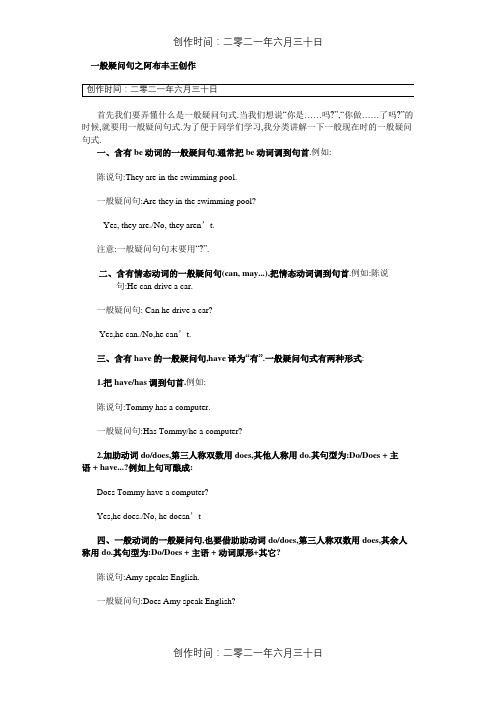
一般疑问句之阿布丰王创作首先我们要弄懂什么是一般疑问句式.当我们想说“你是……吗?”,“你做……了吗?”的时候,就要用一般疑问句式.为了便于同学们学习,我分类讲解一下一般现在时的一般疑问句式.一、含有be动词的一般疑问句,通常把be动词调到句首.例如:陈说句:They are in the swimming pool.一般疑问句:Are they in the swimming pool?Yes, they are./No, they aren’t.注意:一般疑问句句末要用“?”.二、含有情态动词的一般疑问句(can, may...),把情态动词调到句首.例如:陈说句:He can drive a car.一般疑问句: Can he drive a car?Yes,he can./No,he can’t.三、含有have的一般疑问句,have译为“有”.一般疑问句式有两种形式:1.把have/has调到句首.例如:陈说句:Tommy has a computer.一般疑问句:Has Tommy/he a computer?2.加助动词do/does,第三人称双数用does,其他人称用do.其句型为:Do/Does + 主语 + have...?例如上句可酿成:Does Tommy have a computer?Yes,he does./No, he doesn’t四、一般动词的一般疑问句,也要借助助动词do/does,第三人称双数用does,其余人称用do.其句型为:Do/Does + 主语 + 动词原形+其它?陈说句:Amy speaks English.一般疑问句:Does Amy speak English?Yes,she does./No, she doesn’t好了,知道了如何问话之后,我们来了解一下如何回答一般疑问句.首先要有人称的改变.当主语为名词时,在答语中要改成其相应的代词.另外,答语有两种,肯定的回答(用yes)和否定的回答(用no),否定式经常使用缩写形式.现在还是让我们分句型一一说明.一、一般疑问句含be动词时,用be动词回答,句末用句号.例如:-Is Mary your sister?-Yes, she is. / No, she isn’t.(缩写)二、一般疑问句含有情态动词(can, may, should等)时,用情态动词回答.例如:-May I come in?-Yes, you may. / No, you can’t. /Come in, please.三、一般疑问句含有have(译为“有”)时,有两种回答方式.1.直接用have/has回答.例如:-Have they any pictures?-Yes, they have. / No, they haven’t.2.用助动词do/does回答.例如:-Does Millie smoke?-Yes, she does. / No, she doesn’t.四、一般动词的一般疑问句回答时也用助动词.例如:-Do the workers live in London?-Yes, they do. / No, they don’t.一、一般疑问句一般疑问句也可称为“yes /no questions”, 因这种问句通经常使用yes /no来回答, 相当于汉语中的“……吗?”其语序是:系动词be /助动词/情态动词+主语+其他成份?如:Are you from Japan?Yes , I am./No, I'm not.Is her sister doing her homework now?Yes , she is./No , she isn't.Does he work in a bank?Yes , he does./No, he doesn't.Do you live near your school?Yes , I do./No, I don't.Can you speak French?Yes, I can./No, I can't.May I go home now?Yes , you may./No , you mustn't.注意:1.将陈说句酿成一般疑问句时, 如句中有be 动词(am is are …)时, 可直接将它们提至主语前.如主语为第一人称, 应将其改为第二人称.如:I'm in Class 2Grade 1.→ Are you in Class 2, Grade 1?We're watching TV.→ Are you watching TV?2.陈说句中有情态动词(can may must …)时, 也可直接将它们提至主语前, 即可成为一般疑问句.如:He can swim now.→ Can he swim now?The children may come with us.→ May the children come with us?3.陈说句中只有一个实义动词作谓语且其时态为一般现在时, 酿成一般疑问句时要在句首加do或does 主语后的实义动词用原形.如:I like these animals.→ Do you like these animals?She wants to go to the movies.→ Does she want to go to the movies?4.一般疑问句一般读升调(↑) 5.一般疑问句有时不用yes或no 回答.如:Are they in town now?I think so. May I sit here?Certainly.Does he like soccer?Sorry, I don't know.一般疑问句练习情况1: Be(是) am is are先用be的适当形式填空然后依照要求变换句型l I ____ a teacher.一般疑问句:_______________________________肯定回答:____________________________否定回答:____________________________l You _____ a worker.一般疑问句:_______________________________肯定回答:____________________________否定回答:____________________________l He ____ a doctor.一般疑问句:_______________________________肯定回答:____________________________否定回答:____________________________l ______ she a student?陈说句:_______________________________肯定回答:____________________________否定回答:____________________________l ______ we happy?陈说句:_______________________________肯定回答:____________________________否定回答:____________________________l You _____ good workers.一般疑问句:_______________________________肯定回答:____________________________否定回答:____________________________l They _____ workers.一般疑问句:_______________________________肯定回答:____________________________否定回答:____________________________l ______ (它是) an apple.一般疑问句:_______________________________肯定回答:____________________________否定回答:____________________________情况2:have(是) have(第一二人称单复数及第三人称复数) has (第三人称双数)l I _____ three books.一般疑问句:_______________________________肯定回答:____________________________否定回答:____________________________l You _____ a car.一般疑问句:_______________________________肯定回答:____________________________否定回答:____________________________He ____ many trees.一般疑问句:_______________________________肯定回答:____________________________否定回答:____________________________She ____ five beautiful dresses.一般疑问句:_______________________________肯定回答:____________________________否定回答:_________________________________________(我们有) a television?陈说句:_______________________________肯定回答:____________________________否定回答:____________________________They _____ a house in Shenzhen.一般疑问句:_______________________________肯定回答:____________________________否定回答:____________________________情况3.情态动词cancould为can的过去式, 都能暗示能, 或者请求他人的许可.在暗示请求时, 过去式不代表过去时态, 而是使得语气更加委婉.I can speak English.我能说英语.一般疑问句:_______________________________肯定回答:____________________________否定回答:____________________________They can swim.他们能游泳.一般疑问句:_______________________________肯定回答:____________________________否定回答:____________________________You can collect the plates for me.(帮我收失落这些碟子.征求许可)一般疑问句:_______________________________我能帮你收失落这些碟子吗?肯定回答:____________________________否定回答:____________________________情况4.用助动词do, does提问(注意提问时后面的实义动词要用原型!)I like reading books.一般疑问句:_______________________________肯定回答:____________________________否定回答:____________________________He listens to the story.他听故事.一般疑问句:_______________________________肯定回答:____________________________否定回答:____________________________They watch the movie today.一般疑问句:_______________________________肯定回答:____________________________否定回答:____________________________She teaches them English.一般疑问句:_______________________________肯定回答:____________________________否定回答:____________________________He wants to go to Beijing.一般疑问句:_______________________________肯定回答:____________________________否定回答:____________________________情况5:there be表存在, “有”!There is a bird in the tree.一般疑问句:_______________________________肯定回答:____________________________否定回答:____________________________There is a thief(小偷) in the room.一般疑问句:_______________________________肯定回答:____________________________否定回答:____________________________There are five eggs on the table.一般疑问句:_______________________________肯定回答:____________________________否定回答:____________________________There were six students in the classroom yesterday.一般疑问句:_______________________________肯定回答:____________________________。
英语一般疑问句(语法)
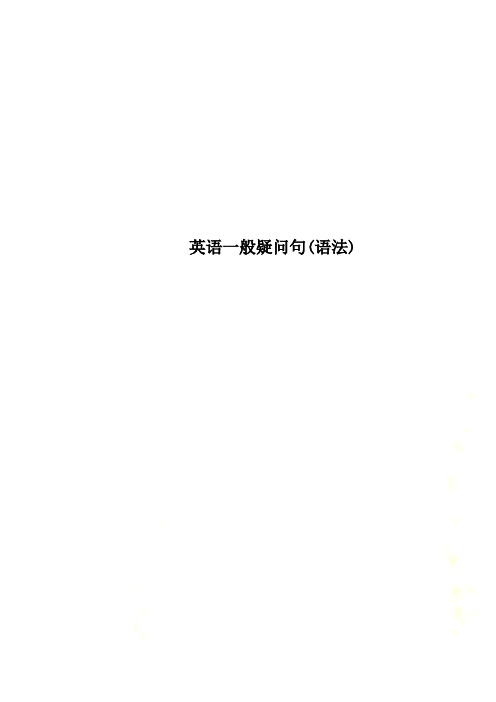
英语一般疑问句(语法)一般疑问句首先我们要弄懂什么是一般疑问句式。
当我们想说“你是……吗?”,“你做……了吗?”的时候,就要用一般疑问句式。
为了便于同学们学习,我分类讲解一下一般现在时的一般疑问句式。
一、含有be动词的一般疑问句,通常把be动词调到句首。
例如:陈述句:They are in the swimming pool.一般疑问句:Are they in the swimming pool?Yes, they are./No, they aren’t.注意:一般疑问句句末要用“?”。
二、含有情态动词的一般疑问句(can, may...),把情态动词调到句首。
例如:陈述句: He can drive a car.一般疑问句: Can he drive a car?Yes,he can./No,he can’t.三、含有have的一般疑问句,have译为“有”。
一般疑问句式有两种形式:1.把have/has调到句首。
例如:陈述句:Tommy has a computer.一般疑问句:Has Tommy/he a computer?2.加助动词do/does,第三人称单数用does,其他人称用do。
其句型为:Do/Does + 主语 + hav e...?例如上句可变为:Does Tommy have a computer?Yes,he does./No, he doesn’t四、一般动词的一般疑问句,也要借助助动词do/does,第三人称单数用does,其余人称用do。
其句型为:Do/Does + 主语 + 动词原形+其它?陈述句:Amy speaks English.一般疑问句:Does Amy speak English?Yes, she does./No, she doesn’t好了,知道了如何问话之后,我们来了解一下如何回答一般疑问句。
首先要有人称的改变。
当主语为名词时,在答语中要改成其相应的代词。
一般疑问句

一、含有be动词的一般疑问句,通常把be动词调到句首。
例如:陈述句:They are in the swimming pool.一般疑问句:Are they in the swimming pool?注意:一般疑问句句末要用“?”。
一般疑问句含be动词时,用be动词回答,句末用句号。
例如:-Is Mary your sister?-Yes, she is. / No, she isn’t.(缩写)二、含有情态动词的一般疑问句(can, may...),把情态动词调到句首。
例如:陈述句:He can drive a car.一般疑问句: Can he drive a car?一般疑问句含有情态动词(can, may, should等)时,用情态动词回答。
例如:-May I come in?-Yes, you may. / No, you can’t.三、含有have的一般疑问句,have译为“有”。
一般疑问句式有两种形式:1.把have/has调到句首。
例如:陈述句:Tommy has a computer.一般疑问句:Has Tommy/he a computer?1.直接用have/has回答。
例如:-Have they any pictures? -Yes, they have. / No, they haven’t.2.加助动词do/does,第三人称单数用does,其他人称用do。
其句型为:Do/Does + 主语+ have...?例如上句可变为:Does Tommy have a computer?2.用助动词do/does回答。
例如:-Does Millie smoke? Yes, she does. / No, she doesn’t.四、一般动词的一般疑问句,也要借助助动词do/does,第三人称单数用does,其余人称用do。
其句型为:Do/Does + 主语+ 动词原形+其它?陈述句:Amy speaks English.一般疑问句:Does Amy speak English?般动词的一般疑问句回答时也用助动词。
英语一般疑问句(语法)
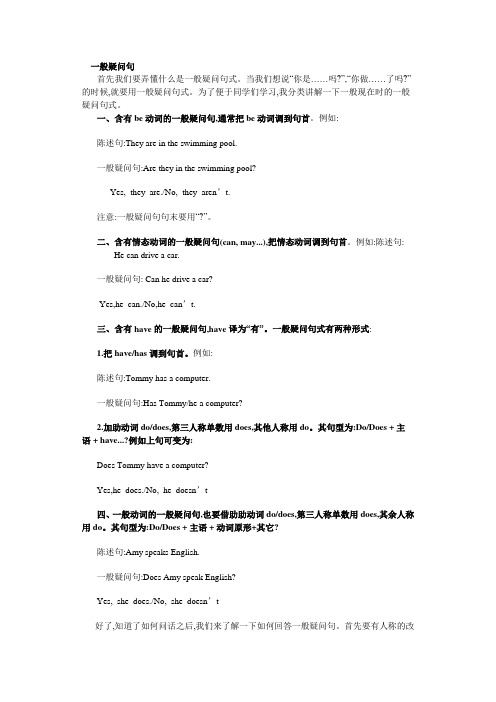
一般疑问句首先我们要弄懂什么是一般疑问句式。
当我们想说“你是……吗?”,“你做……了吗?”的时候,就要用一般疑问句式。
为了便于同学们学习,我分类讲解一下一般现在时的一般疑问句式。
一、含有be动词的一般疑问句,通常把be动词调到句首。
例如:陈述句:They are in the swimming pool.一般疑问句:Are they in the swimming pool?Yes, they are./No, they aren’t.注意:一般疑问句句末要用“?”。
二、含有情态动词的一般疑问句(can, may...),把情态动词调到句首。
例如:陈述句:He can drive a car.一般疑问句: Can he drive a car?Yes,he can./No,he can’t.三、含有have的一般疑问句,have译为“有”。
一般疑问句式有两种形式:1.把have/has调到句首。
例如:陈述句:Tommy has a computer.一般疑问句:Has Tommy/he a computer?2.加助动词do/does,第三人称单数用does,其他人称用do。
其句型为:Do/Does + 主语 + have...?例如上句可变为:Does Tommy have a computer?Yes,he does./No, he doesn’t四、一般动词的一般疑问句,也要借助助动词do/does,第三人称单数用does,其余人称用do。
其句型为:Do/Does + 主语 + 动词原形+其它?陈述句:Amy speaks English.一般疑问句:Does Amy speak English?Yes, she does./No, she doesn’t好了,知道了如何问话之后,我们来了解一下如何回答一般疑问句。
首先要有人称的改变。
当主语为名词时,在答语中要改成其相应的代词。
另外,答语有两种,肯定的回答(用y es)和否定的回答(用no),否定式常用缩写形式。
- 1、下载文档前请自行甄别文档内容的完整性,平台不提供额外的编辑、内容补充、找答案等附加服务。
- 2、"仅部分预览"的文档,不可在线预览部分如存在完整性等问题,可反馈申请退款(可完整预览的文档不适用该条件!)。
- 3、如文档侵犯您的权益,请联系客服反馈,我们会尽快为您处理(人工客服工作时间:9:00-18:30)。
一般疑问句
一、一般疑问句有两种:一种是由be动词引起的疑问句,
另一种是由助动词或情态动词引起的疑问句,此处要讲前一种。
1.含有be动词的一般疑问句的构成。
be动词引起的一般疑问句的构成是在肯定句的基础上将be动词(am ,is,are)移至主语之前,这时be动词已在句首,第一个字母应大写,句末用问号。
2.一般疑问句的答语。
肯定回答为“Yes,主语+ am/is/are.”;
否定回答为“No,主语+ am/is/are + not.”。
—Are you twelve?
你十二岁吗?
—Yes, I am.是的,我是。
/No, I’m not.不,我不是。
注意:不可以写成“Yes,I’m.”或“No,I amn’t.”。
3.如何变一般疑问句
“一调”是把be动词提至主语前;“二变”是原主语及be动词首字母大小写和人称的改变;“三问号”是句末用问号,读成升调。
(注意第一人称)
二、练习
对一般疑问句进行回答。
1.—Are you eight?
—Yes,. /No,.
2.—Am I in Class Four?
—Yes,./No,.
3.—Are they students?
—Yes,./No,.
4.—Is that her cup?
—Yes,./No,.
5.—Is he Eric?
—Yes,. /No,.
6.Are these pencils Anna’s?
(做肯定回答)7.Are those pencils Bob’s?
(做否定回答)
将陈述句变为一般疑问句。
8.This is her ruler. ___________________________
9.Those are your books.
10.I am Tom.
11.These are Lily’s pens.
12.This is an eraser. ___________________________
13.That is a Chinese book. __________________________
14.(济南中考)She is good at playing the piano (钢琴).
good at playing the piano?
15.(临沂中考)There are some flowers (花) in the garden (花园).
any flowers in the garden?。
